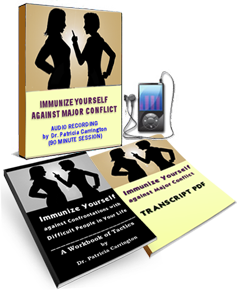 Problems of any kind that involve our relationships can have a strong impact on us. Sometimes we feel so intensely about them that we can’t conceive of not making an effort to change the other person. To tap using EFT on your difficulty with another person under highly emotional circumstances can be like tackling a whole army at once instead of individual foot soldiers one at a time. It can be too big a job.
Problems of any kind that involve our relationships can have a strong impact on us. Sometimes we feel so intensely about them that we can’t conceive of not making an effort to change the other person. To tap using EFT on your difficulty with another person under highly emotional circumstances can be like tackling a whole army at once instead of individual foot soldiers one at a time. It can be too big a job.
One of the most effective ways to deal with the problem of “relationship overwhelm” is to “divide and conquer” it. This involves dividing your perception of the other person, or of a situation with that person, into such small portions that you can successfully tap down each of the portions separately and without difficulty. Often you need to use EFT on only one or two small components to change your attitude about an entire situation. As an old saying goes, “In each raindrop, we see the whole sky.” The small contains the big in a very important sense.
The Messy Roommate
For example, imagine a college student (let’s call her Adrian) who is upset because her roommate is not willing to keep their apartment cleaned. It seems to her that her roommate is constantly scattering junk around, and Adrian is sick of tripping over it and having dirty dishes pile up in the sink. Also, suppose that her anger at her roommate seems too intense to tap on directly, and so she decides to use the divide and conquer tactic.
When she pictures her roommate’s clothes, notebooks, and letters scattered all over the floor, she typically finds this disgusting, so she decides to imagine one little corner of the mess, one “tiny, important detail of it.”
She settles on an envelope that has been kicked out of place and is lying where she might step on it. The address is scrawled and the envelope has a crooked cancelled postage stamp on it.
She uses the following EFT Statement:
“Even though her messiness drives me wild, I choose to let go of wanting to control the way that stamp is positioned on the envelope.”
This of course makes no logical sense, since she doesn’t want to change the position of the stamp in the first place, but that makes it easy to tap on and, strangely, this tactic is very likely to work. Often people will burst into laughter after they finish tapping on such a trivial thing. If Adrian can let go of wanting to control how the stamp is placed, her whole relationship with her roommate is likely to seem lighter and easier.
To help her along even further, let’s say Adrian then decides to focus on the way the letter, itself, is lying on the floor – whether it is turned sideways, catty-corner, or straight.
If she can tap on this trivial aspect of the situation, she may eventually be able to tap on wanting to control the way all of the letters are scattered about. This may seem to be a rather tedious process at first but what can happen is that it greases the wheels for the person doing it. By building up to the big challenge using little steps, Adrian is likely to arrive at a point where she can feel comfortable about the thing that has been troubling her most – the total disarray in her home.
Through having tapped away her urgency and anger about this, Adrian is more likely to be able to mobilize her energies for a realistic solution of what, to neat and orderly people, can be a great burden. She may now be able to see that anger is not the answer and seek a more practical solution. She may decide to eventually move out and live under circumstances that would be more acceptable, or intervene in the roommate’s cleaning up so that the apartment will be more compatible for her in the meanwhile. Whatever solution she chooses, the problem is likely to have receded in importance and become more manageable.
By tapping away our need to control an annoying situation, step-by-step, we are able to see ways of acting that could change that situation.
The Grumpy Husband
In another example, a client of mine discovered her husband was sulking and being difficult at dinner. Initially, she found herself extremely annoyed because she placed a high value on families being friendly and relating well to one another at dinnertime. Then she started to mentally tap to handle her feelings.
She began by tapping on her wish to change the way John’s hair was falling over his forehead (actually this was something she really didn’t care about, so it was easy to tap on!) Then she tapped on wanting to change the flush on his cheeks (something that also really didn’t bother her), and so on through a long list of unimportant details about him.
And each time she tapped, she successively let go of wanting to control another small portion of the way he looked, so she soon found her own sense of humor coming into play. At that point, having cleared a lot by using the divide-and-conquer technique mentally, she suddenly realized that her husband looked excessively tired and as she put it “bushed and sort of ‘out of it’.” What she decided to do was to cheer him up by distracting him. It worked, and the interpersonal crisis that had been building up was averted.
When you use this divide and conquer tactic, it is seldom necessary to tap on all portions of the original experience. It can be a surprising tactic to use because once you tap successfully on letting go of a portion (or several portions) of a situation that bothers you, you may find, to your astonishment, that your feelings about the entire situation have changed!
The difference between tapping on the whole situation, and tapping on only a tiny portion of it is considerable. There is usually no reason not to let go of wanting to change some minor aspect of the situation, but you probably could think of many reasons for not letting go of wanting to change the whole situation. In fact, common sense suggests that we really should let go of wanting to change unimportant details.
I strongly recommend you use the divide-and-conquer tactic whenever you find yourself locked in to a situation about which you feel so strongly that you really do not want to in any way change your resentment or sense of entitlement or let go of your inner pain. We all want to cling onto unpleasant emotions at times and thereby justify them – it is only human. The divide-and conquer tactic allows you to accept unimportant details of a situation until suddenly the whole situation looks entirely different to you. You then see it from a new perspective and can act accordingly.
RELATED PRODUCT
Immunize Yourself Against
Major Conflict
Are you ready to discover how you can protect yourself against verbal aggression and its ill effects? Use this special form of EFT Tapping to deflect a verbal assault from someone that confronts you aggressively, or from your own negative self-accusations.







Very interesting Pat thank you for sharing these simple yet very effective suggestions warm thoughts from Mair http://www.TickhillClinic.com
Mary’s book just published and available on Amazon – “EFT Constellations” by EFT Founding Master Mary Llewellyn